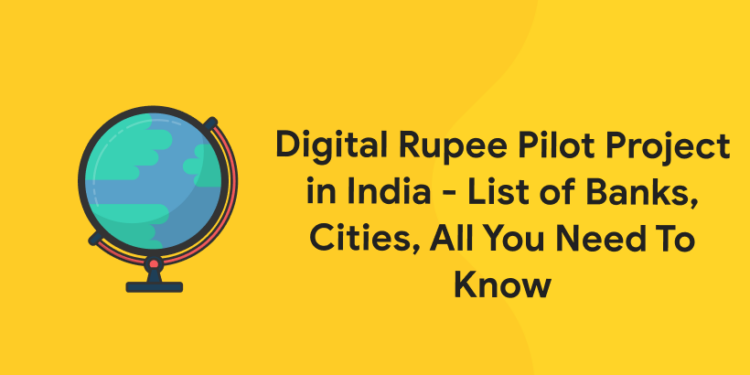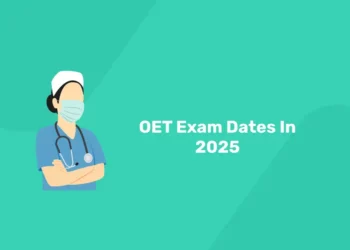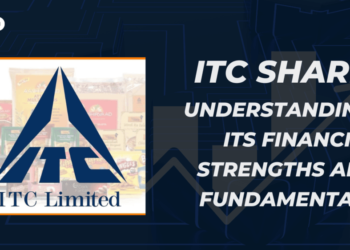Table of Contents
On December 1, 2022, the Reserve Bank of India (RBI) will trial the release of India’s Central Bank Digital Currency (CBDC) for retail customers. Eight banks have been selected by the central bank to participate in this trial gradually. The retail digital rupee will be in the form of a digital token that represents legal tender. It would be distributed in the same denominations as existing coins and paper money. It would be distributed through intermediaries, i.e., banks. Users can conduct transactions with e-R using a digital wallet provided by the financial institutions and stored on mobile phones or other devices.
The pilot will initially cover the four cities of Mumbai, New Delhi, Bengaluru, and Bhubaneswar, where customers and merchants can use the digital rupee (e₹-R) or e-rupee. The controlled launch of the digital currency in these four cities will be carried out by four banks: State Bank of India, ICICI Bank, Yes Bank, and IDFC First Bank. Ahmedabad, Gangtok, Guwahati, Hyderabad, Indore, Kochi, Lucknow, Patna, and Shimla, will all receive the service in the future. Bank of Baroda, Union Bank of India, HDFC Bank, and Kotak Mahindra Bank are four other financial institutions.
However, unlike cash, the digital currency does not accrue interest and can be exchanged for other types of payment like bank deposits. The central bank further said that P2P (person-to-person) and P2M (person-to-merchant) transactions are also permitted through e₹-R.
What is Digital Currency? Digital Currency Definition
A medium of exchange that has generated, stored, and transferred digitally is known as a digital currency. In detail, any cash, or money that has been handled, stowed, or exchanged primarily on digital computer systems, particularly over the internet, is referred to as digital currency. Unlike the coins and notes of traditional currencies, Digital currencies are not typically associated with any country’s government or represented in physical forms. However, Electronic versions of currencies already predominate most countries’ financial systems.
Which Banks Are To Participate In The Retail Digital Rupee Pilot?
1: Who was the first woman President of India?
ght banks have been selected by the central bank to participate in this trial gradually. Initially, he controlled the launch of the digital currency carried out by four banks
- State Bank of India
- ICICI Bank
- Yes Bank
- IDFC First Bank
Ahmedabad, Gangtok, Guwahati, Hyderabad, Indore, Kochi, Lucknow, Patna, and Shimla, will all receive the service in the future. Bank of Baroda, Union Bank of India, HDFC Bank, and Kotak Mahindra Bank are four other financial institutions.
Which Cities Are To Participate In The Retail Digital Rupee Pilot?
he pilot will initially cover the four cities
- Mumbai
- New Delhi
- Bengaluru
- Bhubaneswar
Ahmedabad, Gangtok, Guwahati, Hyderabad, Indore, Kochi, Lucknow, Patna, and Shimla, will all receive the service in the future
Understanding Digital Money – How Does Digital Currency Work
Digital money is different from cash because it improves the process of monetary transactions. Moreover, it is similar in concept and uses to its cash counterpart in that it can be a unit of account and a medium for daily transactions. But not in the form of cash. Cash maintained in online bank accounts is one example of a sort of digital money that exists in today’s culture. This cash can be sent to others or received from them. Additionally, it can use for online purchases.
Types of Digital Currency in India – Full List
Digital money, also known as Electronic money, Digital currency, and Electronic currency, is a kind of money purely available in digital form. It is not a tangible asset like cash or other commodities like gold or oil. Digital money can divide into several categories, including stablecoins, central bank digital currencies, and cryptocurrencies. Find below each in detail.
What is Cryptocurrencies?
Digital money generated with encryption is known as cryptocurrency. It is one of the most common categories of digital currency, familiar to each people. A digital currency is wrapped in a cryptographic system to increase security and make transactions difficult to manipulate. The most popular cryptocurrencies are Bitcoin and Ethereum. Depending on the jurisdiction, cryptocurrencies may or may not be regulated. To use cryptocurrencies, you need a cryptocurrency wallet. These wallets can be software that is downloaded to your PC, mobile device, or the cloud. Your encryption keys—which serve as a means of identification and a connection to your cryptocurrency—are kept in your wallets.
What are the Risks to Using Cryptocurrency?
A government or central bank does not support cryptocurrencies
The value of a cryptocurrency is unrelated to commitments made by a government or central bank, unlike the majority of traditional currencies like the U.S. dollar.
Cryptocurrencies are not a risk-free investment
There are no guarantees for Cryptocurrencies, just like with other investing opportunity.
A cryptocurrency’s value can change constantly and dramatically
An investment that is currently worth thousands of dollars could only be worth a few hundred dollars tomorrow. There is no assurance that the value will increase again if it decreases.
What is Stablecoins?
An unregulated digital currency that is controlled by its developer(s), its founding organization, or its defined network protocol. Stablecoins are digital currencies whose value is tied to another coin, commodity, or financial instrument. It is more useful than more-volatile cryptocurrencies as a medium of exchange. Stablecoins aim to propose an alternative to the most widely used cryptocurrencies’ significant volatility, notably Bitcoin (BTC), which has made crypto investments less appropriate for everyday transactions. Stablecoins are classified into different types; Fiat-Collateralized Stablecoins, Crypto-Collateralized Stablecoins, and Algorithmic Stablecoins
What is Central Bank Digital Currencies?
Central bank digital currencies,also known as digital fiat currency or digital base money are digital tokens, similar to cryptocurrency, issued by a central bank rather than by a commercial bank. The present concept of CBDCs was influenced by Bitcoin and other blockchain-based cryptocurrencies, but differs from such a virtual currency and cryptocurrency in that a CBDC is or would be issued by a state. The first digital money to be issued by a major economy was the RMB in China. As of July 2022, four central banks have launched a CBDC: the Central Bank of The Bahamas (Sand Dollar), the Eastern Caribbean Central Bank (DCash), the Central Bank of Nigeria (e-Naira) and the Bank of Jamaica (JamDex). Some nations have also released cryptocurrencies or have thought about doing so, such as Venezuela (Petro) and the Marshall Islands (Sovereign) and These digital currencies are sometimes taken into consideration in an effort to increase a state’s independence from international financial institutions.
Characteristics of Digital Currencies
- Do not in physically tangible form
- It can be centralized or decentralized
- Digital currencies can transfer value
- Fast Transfer and Transaction
- Cheap cost for transaction
- No Physical Manufacturing Required
Advantages of Digital Currencies
- Lower transaction cost
- No chargebacks
- Fast Transfer
- Trustworthy
- No inflation
- Easier business transactions with foreign clients
Disadvantages of Digital Currencies
- Lack of Regulations
- Cryptocurrency Value and Volatility can change constantly and dramatically
- No government or central bank support
- Lack of understanding of concepts surrounding the new currency
- Technological confusions













